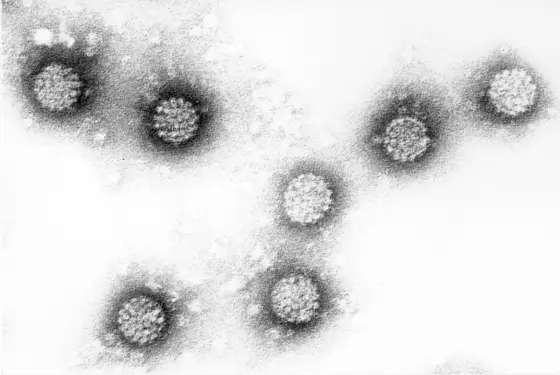Most people are familiar with the human papillomavirus (HPV), especially in connection with cervical cancer. However, the viruses - especially the high-risk type HPV-16 - can also cause other types of cancer, including anal cancers and oropharyngeal carcinomas, i.e. tumors in the back third of the tongue and pharyngeal tonsils. These tumors mainly affect men.
In fact, almost 50 percent of oropharyngeal carcinomas in Germany can be traced back to HPV - and the trend is rising. Whether the tumor is caused by an HPV infection has a strong impact on survival. Scientists around Tim Waterboer, DKFZ, now wanted to know whether the detection of antibodies against HPV could be suitable for early detection. “Tumors are very rare, so that comprehensive screening would not be useful,“ the virologist and epidemiologist says. “However, for certain high-risk groups, such early detection could be useful“. HPV-associated oropharyngeal carcinomas can often be successfully treated. “However, in larger tumors, treatment can lead to speech and swallowing problems as well as other massive limitations in quality of life,“ says Waterboer.
In collaboration with Australian scientists, the DKFZ researchers analyzed blood samples from a total of 617 men who participated in a prospective study on anal carcinoma. In the process, they searched not only for antibodies against the envelope protein of the virus, but also for those directed against proteins that are produced early in the reproduction cycle of HPV. These can act as oncoproteins, i.e. they can promote cancer. “It is known that most people with HPV-associated oropharyngeal carcinomas have more of these antibodies against early viral proteins in their blood than people who are infected but do not develop tumors,“ Waterboer explains.
Of the 617 study participants, almost half had antibodies against the HPV envelope protein. This is not surprising at first, because most people experience HPV infection at some point in their lives - often without realizing it. In 13 of the men, the scientists also detected antibodies against the early proteins. One man who had high antibody levels against four of the early proteins was particularly noticeable. In two other subjects, the antibodies against two of the early proteins were elevated.
The scientists then contacted the affected men to examine them for possible oropharyngeal carcinomas. It turned out that the man with a particularly conspicuous antibody status had already died as a result of such a tumor. “In addition, one of the men with antibodies against two early proteins was diagnosed with oropharyngeal carcinoma, which had not yet caused any symptoms and was easily treatable,“ says Waterboer. In the remaining conspicuous test subjects, there was no evidence of a tumor. However, they will be closely examined in the future.
“As far as we know, this is the first prospective study that shows an association between antibody status and an increased risk of oropharyngeal carcinoma in symptom-free study participants,“ says Waterboer. The scientist also assumes that the higher the antibody level against early proteins and the more early proteins are recognized by the immune system, the greater the risk. However, further studies with a larger number of test persons are necessary for definitive proof.
“We hope that our results will one day help to develop screening for early detection of oropharyngeal carcinoma in high-risk groups,“ says Waterboer. In this context, he also emphasizes the importance of HPV vaccination for both sexes. “Preventing HPV infection can not only protect against cervical cancer, but also against other HPV-associated tumors“.
Tim Waterboer, Nicole Brenner, Richard Gallagher, Richard John Hillman, Fengyi Jin, Andrew Grulich, Isobel Mary Poynten: Early Detection of Human Papillomavirus–Driven Oropharyngeal Cancer Using Serology From the Study of Prevention of Anal Cancer.
Jama Oncology 2020, DOI:10.1001/jamaoncol.2020.4527



